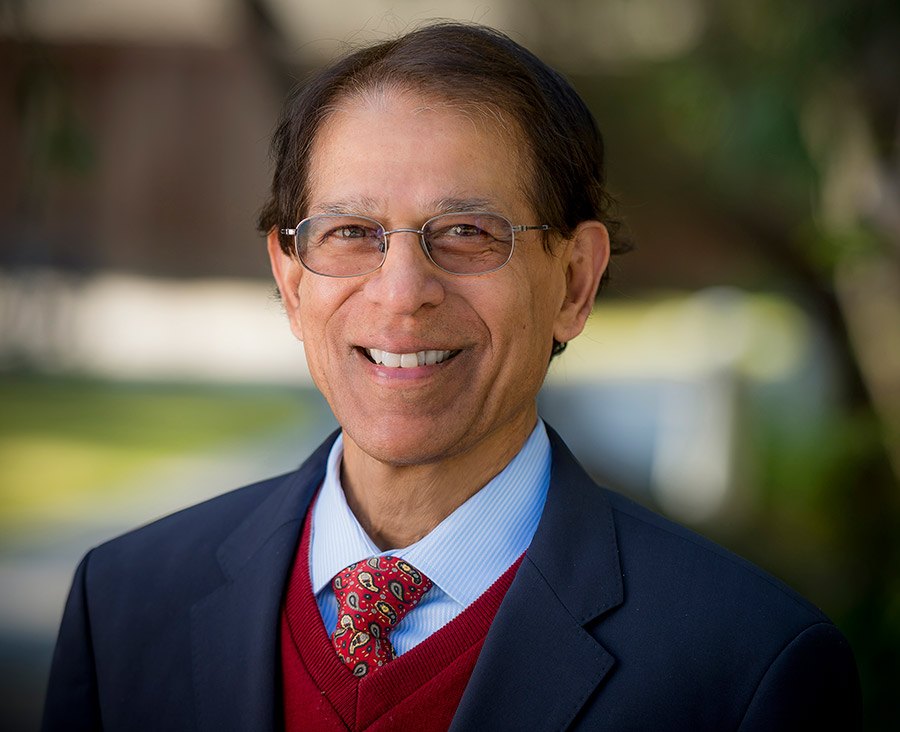By:
- Scott LaFee
Published Date
By:
- Scott LaFee
Share This:
UC San Diego to Host Its First National Think Tank on Aging Issues Nov. 14-16
Aging is something we all do. It’s a matter of how well we do it.

Dr. Dilip Jeste
As we get older, almost every aspect of life conjures new and pressing questions. It’s the same for individuals and for graying nations. (By 2030, one in five Americans will be 65 years or older. For the first time, older adults will outnumber children.) Some questions, like health care, are obvious: Who will take care of us? Will we get the medicines and treatments we need? Can we afford them?
But other questions are no less compelling: Where will older Americans live? How will technology change their lives? What social roles will they play?
“Aging happens slowly and it’s easy to postpone addressing these questions because it’s not a crisis of the moment,” said Dr. Dilip Jeste, Distinguished Professor of Psychiatry and Neurosciences and director of the Sam and Rose Stein Institute for Research on Aging at UC San Diego. “But one day we’ll look around and suddenly realize that almost everybody is old and we still don’t have answers to these questions. That’s why we have to start talking now.”
Jeste and colleagues are trying to lead that conversation – and in the process make UC San Diego a national, and perhaps international, hub for addressing the challenges and opportunities of an older America and world. (Right now, there are 550 million people older than 65 in the world; in 2050, that number is projected to be 2 billion.)
Jeste is senior associate dean for healthy aging and senior care (the university’s first) and director of the newly established Center for Healthy Aging and Senior Care, both announced earlier this year. UC San Diego will host its first national think tank on aging issues Nov. 14-16, with experts from around the country and world attending to discuss the demographics of aging, new geriatric healthcare models, an older workforce and senior-centric technologies. The think tank meeting will culminate Sunday, Nov. 16, with a free public seminar from 2 p.m. to 4 p.m. in the Medical Education/Telemedicine auditorium on the School of Medicine campus.
In addition to Jeste, other experts slated to speak at the seminar are: Dr. Dan Blazer II, a professor of psychiatry and behavioral sciences at Duke University; Kim Goodsell, co-founder of ProAbility WalkArt; Kiang J. Liu, professor of preventive medicine- epidemiology and geriatrics at Northwestern University; Dr. Judith A. Salerno, president and CEO of Susan G. Komen; and William Vega, provost professor and executive director of the Roybal Institute on Aging at University of Southern California.
Driving the aging demographic in the United States are baby boomers born between 1946 and 1964. The first boomers reached age 65 and retirement in 2011, and their numbers have steadily increased. By 2030, there will be more than 73 million Americans age 65 or older. Perhaps more astoundingly, by 2040 there will be more than 28 million Americans aged 80 or over – three times the number in 2000.
“Older boomers are different than previous generations of seniors,” said Jeste. “On the plus side, they are more highly educated, more health conscious, more activist. On the minus side, they tend to have higher rates of depression, anxiety disorders and substance abuse.”
These newer older Americans, he said, have higher expectations of later life. “They are not just going to get old, retire and call it a day. They want something to happen, something that will help keep their bodies and minds healthy, active, and alive.”
Solutions to the challenges of getting old will not be easy, but Jeste hopes to create a go-to place in which to create them. “I believe UC San Diego has a unique opportunity to become a local, regional, national, even global, leader in this field,” he said. “There are not too many great role models of this type at the moment. There has been too little attention paid. It’s a matter of philosophy. I don’t think of aging as a disease to be cured, but a process to be enhanced.”
As such, Jeste has pulled together a diverse collection of experts to be members of the UC San Diego Center for Healthy Aging. They represent varied disciplines on campus, from the School of Medicine and the Skaggs School of Pharmacy and Pharmaceutical Sciences to the Jacobs School of Engineering and Qualcomm Institute, from local government to private foundations to business leaders in health care, housing and social services. Jeste believes these experts, by cross-pollinating their ideas and abilities, can address aging issues in new ways that will provide a roadmap for policymakers and social drivers.
“For example, housing for seniors is something most academicians don’t talk about. The whole concept of home and house is changing, especially for older people. Seniors are not going to be happy in traditional retirement communities. They want active places where they can socialize, but not be segregated from others. They can do that in their own homes, but those homes will need to look and be different, with technologies perhaps not yet invented that address their particular needs.”
The Nov. 14-16 think tank meeting is a first step in that direction. Subsequent think tank meetings, perhaps two a year, will focus on issues of community engagement and lifestyle. In the few months since the center was created, Jeste said much has been achieved. “People want to hear our message. Once you begin the conversation, they realize it’s like what John F. Kennedy once said, ‘If not now, when? If not us, who?’”
We’re not getting any younger.
Share This:
You May Also Like
Stay in the Know
Keep up with all the latest from UC San Diego. Subscribe to the newsletter today.



